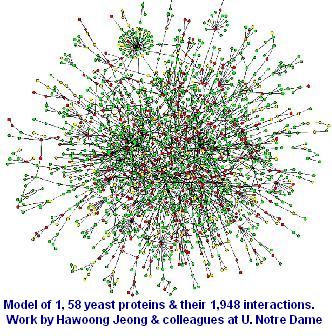| |
The Proteome
Since the DNA of each organism is unique, the proteins that it makes are also unique to itself. The proteome is the entire complement of proteins, including the modifications made to some of them, produced by an organism at any particular time.
A cellular proteome is all the proteins found in a specific cell type under a particular set of environmental conditions.
Since the proteome is unique, it constitutes a "fingerprint" of the organism that produced it.
Proteomics is the Study of Proteomes
Proteomics is the large-scale study of proteins, particularly their structure and functions.
While an organisms genome (DNA) is usually constant in each of its cells, the expression of its genes and therefore its proteome differs - from cell to cell, over time and with environmental conditions.
Because of changes in gene expression, a complete description of the DNA sequence of a genome provides relatively little understanding of what is actually happening in the organism. Even knowing the gene expression into proteins does not account for changes in those proteins after they are made.
The study of proteomics seeks to understand protein function as it relates to its environmental and biological setting, and to discover if a particular modification in a protein is required for the function to occur.
Proteomics and Disease Research
The identification of proteins that are associated with a disease may lead to the development of new drugs that can target those proteins. Specific proteins, called biomarkers, are often produced for particular diseases, and tests are being developed to test for these proteins to make diagnoses. Such maladies include Alzheimers and cardiovascular (heart) disease.
|
|

Current Projects
Projects to detect the entire human proteome include:
GeneBio - in Geneva. GeneBio has molecular scanners to automate the process of separation and identification of thousands of cell proteins, uses automation to remove protein spots, cut proteins into fragments with enzymes, and then maps the fragments in a mass spectrometer, which plots the pieces by their mass (a protein fingerprint).
Human Tumor Gene Index Project of the National Cancer Institute. This project examines mRNA's made by cancer. Some 50,000 genes are known to be active in one or more cancers. Breast cancer has some 5,692 active genes, with some 277 genes not active in other tissues. Drugs that can be found to bind to those 277 genes (or their products) might be good candidates for anti-cancer drugs.
Proteomics Aids & Study of Evolution
The study of genomes and proteomes has also led to the discovery of similar proteins in distantly related organisms. From the large amount of data available, scientists can better understand evolution of life on earth and how it changes with the environment.
|
|